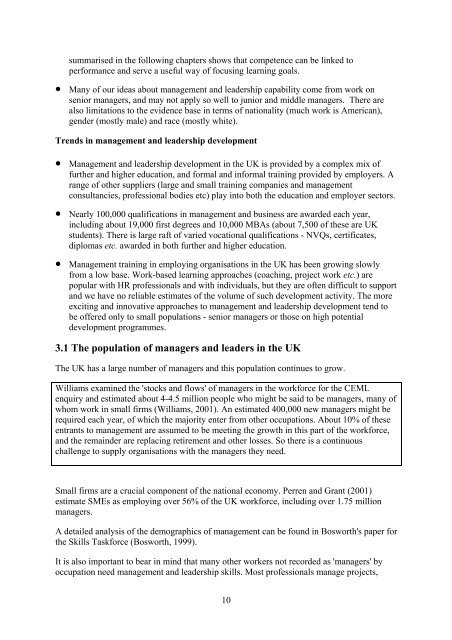The Development of Management and Leadership Capability and its ...
The Development of Management and Leadership Capability and its ...
The Development of Management and Leadership Capability and its ...
You also want an ePaper? Increase the reach of your titles
YUMPU automatically turns print PDFs into web optimized ePapers that Google loves.
summarised in the following chapters shows that competence can be linked to<br />
performance <strong>and</strong> serve a useful way <strong>of</strong> focusing learning goals.<br />
• Many <strong>of</strong> our ideas about management <strong>and</strong> leadership capability come from work on<br />
senior managers, <strong>and</strong> may not apply so well to junior <strong>and</strong> middle managers. <strong>The</strong>re are<br />
also limitations to the evidence base in terms <strong>of</strong> nationality (much work is American),<br />
gender (mostly male) <strong>and</strong> race (mostly white).<br />
Trends in management <strong>and</strong> leadership development<br />
• <strong>Management</strong> <strong>and</strong> leadership development in the UK is provided by a complex mix <strong>of</strong><br />
further <strong>and</strong> higher education, <strong>and</strong> formal <strong>and</strong> informal training provided by employers. A<br />
range <strong>of</strong> other suppliers (large <strong>and</strong> small training companies <strong>and</strong> management<br />
consultancies, pr<strong>of</strong>essional bodies etc) play into both the education <strong>and</strong> employer sectors.<br />
• Nearly 100,000 qualifications in management <strong>and</strong> business are awarded each year,<br />
including about 19,000 first degrees <strong>and</strong> 10,000 MBAs (about 7,500 <strong>of</strong> these are UK<br />
students). <strong>The</strong>re is large raft <strong>of</strong> varied vocational qualifications - NVQs, certificates,<br />
diplomas etc. awarded in both further <strong>and</strong> higher education.<br />
• <strong>Management</strong> training in employing organisations in the UK has been growing slowly<br />
from a low base. Work-based learning approaches (coaching, project work etc.) are<br />
popular with HR pr<strong>of</strong>essionals <strong>and</strong> with individuals, but they are <strong>of</strong>ten difficult to support<br />
<strong>and</strong> we have no reliable estimates <strong>of</strong> the volume <strong>of</strong> such development activity. <strong>The</strong> more<br />
exciting <strong>and</strong> innovative approaches to management <strong>and</strong> leadership development tend to<br />
be <strong>of</strong>fered only to small populations - senior managers or those on high potential<br />
development programmes.<br />
3.1 <strong>The</strong> population <strong>of</strong> managers <strong>and</strong> leaders in the UK<br />
<strong>The</strong> UK has a large number <strong>of</strong> managers <strong>and</strong> this population continues to grow.<br />
Williams examined the 'stocks <strong>and</strong> flows' <strong>of</strong> managers in the workforce for the CEML<br />
enquiry <strong>and</strong> estimated about 4-4.5 million people who might be said to be managers, many <strong>of</strong><br />
whom work in small firms (Williams, 2001). An estimated 400,000 new managers might be<br />
required each year, <strong>of</strong> which the majority enter from other occupations. About 10% <strong>of</strong> these<br />
entrants to management are assumed to be meeting the growth in this part <strong>of</strong> the workforce,<br />
<strong>and</strong> the remainder are replacing retirement <strong>and</strong> other losses. So there is a continuous<br />
challenge to supply organisations with the managers they need.<br />
Small firms are a crucial component <strong>of</strong> the national economy. Perren <strong>and</strong> Grant (2001)<br />
estimate SMEs as employing over 56% <strong>of</strong> the UK workforce, including over 1.75 million<br />
managers.<br />
A detailed analysis <strong>of</strong> the demographics <strong>of</strong> management can be found in Bosworth's paper for<br />
the Skills Taskforce (Bosworth, 1999).<br />
It is also important to bear in mind that many other workers not recorded as 'managers' by<br />
occupation need management <strong>and</strong> leadership skills. Most pr<strong>of</strong>essionals manage projects,<br />
10
















